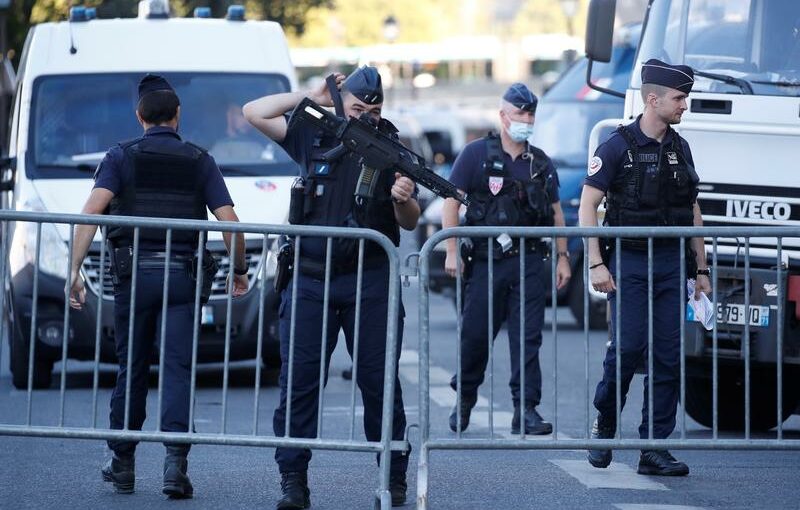PARIS (Reuters) -A French-Moroccan believed to be the only surviving member of a group that killed 130 people in a rampage across Paris described himself on Wednesday as “an Islamic State soldier” at the start of the trial into the 2015 attacks.
Salah Abdeslam appeared in court dressed in black and with a black face mask, one of 20 men accused of involvement in attacks by gunmen in suicide vests on six restaurants and bars, the Bataclan concert hall and a sports stadium on Nov. 13, 2015.
Responsibility for the attacks, in which hundreds were also injured, was claimed by Islamic State, which had urged its followers to attack France over its involvement in the fight against the radical group in Iraq and Syria.
Police mounted tight security around the Palais de Justice courthouse in central Paris, with defendants due to appear being a reinforced glass partition in a purpose-built courtroom.
Asked what his profession was, Abdeslam, 31, told the court: “I gave up my job to become an Islamic State soldier.”
“I want to testify that there is no god except Allah and that Mohammad is his servant,” he said.
Before the trial, survivors and relatives of the victims had said they were impatient to hear testimony that might help them better understand what happened and why it did so, and that they were also anxious.
“It is important that the victims can bear witness, can tell the perpetrators, the suspects who are on the stand, about the pain,” Philippe Duperron, whose 30-year-old son Thomas was killed in the attacks, told Reuters.
“We are also awaiting anxiously because we know that as this trial takes place the pain, the events, everything will come back to the surface,” said Duperron, who is the president of a victims’ association and will testify at the trial.
TESTIMONIES
The trial will last nine months, with about 1,800 plaintiffs and more than 300 lawyers taking part in what Justice Minister Eric Dupond-Moretti has described as an unprecedented judicial marathon.
The 20 defendants include 11 who are already in jail pending trial. Six will be tried in absentia – most of them are believed to be dead.
Abdeslam is widely reported to have remained silent during the investigation.
“What I care about in the trial is the testimony of other survivors, people who were in the terraces (that were targeted by the attackers), at the Stade de France, hear how they have been coping over the past six years,” said 48-year-old Jerome Barthelemy. “As for the accused, I don’t even expect them to speak.”
Most of the accused face life imprisonment if convicted. The other suspects are accused of helping to provide guns and cars or playing a role in organising the attacks.
The first days of the trial are expected to be largely procedural, with plaintiffs being registered, though judges may read a summary of how the attacks unfolded.
Victims’ testimonies are set to start on Sept.28, with one week devoted to the attacks on the Stade de France and cafes, and four to the Bataclan.
The questioning of the accused will start in November but they are not set to be questioned on the night of the attacks and the week before them until March.
A verdict is expected in late May.
More than 1,000 police will be devoted to ensuring the security of the trial and all people allowed into the specially-built courtroom will have to pass through several checkpoints.
“The terrorist threat in France is high, especially at times like the attacks’ trial,” Interior Minister Gerald Darmanin told France Inter radio.
Source: Read Full Article
